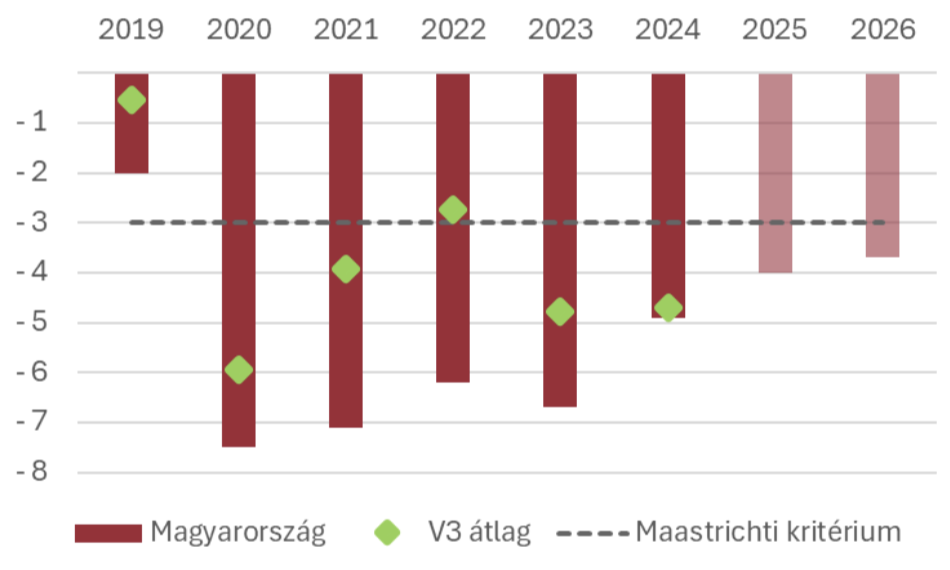GKI Analysis: This is why the 2026 budget is unsustainable
The Parliament adopted the 2026 “anti-war” budget, which, according to most analysts, contains unsustainable commitments and exaggerated macroeconomic expectations.
Fiscal discipline was sacrificed after 2019, and the domestic public deficit significantly exceeded the average of the V3 (Poland, Czech Republic, Slovakia) year after year. So the problem is only partly of external origin (global economic processes, energy prices). The 2025 and 2026 budgets also – despite prior promises – expect a deficit of over 3%, so the Maastricht criteria for the introduction of the euro are not the goal of economic policy. It is another matter whether even the planned deficit targets will be achieved.
Accrual balance of the Hungarian and V3 countries’ public finances (2025 and 2026: Planned by the Government)

Source: Eurostat and Parliament
A significant problem is that the government’s expectations for 2025 (on which the 2026 budget is based) are not based on reality either. While the budget expects economic growth of 2.5% this year, some experts are forecasting only 0.5%, while the GKI is forecasting 0.8%, with strong downside risks. Since the 2025 GDP will be significantly lower than planned, tax revenues will also fall short of expectations. All this puts the planned deficit for this year (3.9%), which the GKI estimates will be around 4.7%, into brackets.
The budget expects growth of 4.1% and a deficit of 3.7% in 2026. The analyst consensus is much more pessimistic. The GKI – in line with the analyst consensus – expects a 2.5% growth, so we expect a further significant shortfall in tax revenue. The new factories (BMW, CATL, BYD, EVE Power) contribute significantly to the GDP growth, which in fact provide a modest increase in tax revenue, given the low specific domestic value added.
Related news
GKI Analysis: We invest, but we don’t make progress
GKI has recently prepared a comprehensive series of analyses on…
Read more >Private Labels Are Quietly Winning Europe’s Grocery Shelves
Private labels are no longer just catching up – they…
Read more >Price stability is still far away – a price index of 4.3% is expected this year
In May 2025, Hungary’s Central Statistical Office (KSH) reported a…
Read more >Related news
The first students participating in dual vocational training at Nestlé Hungária’s training center in Szerencs have successfully graduated.
This year, the first students in Szerencs graduated from Nestlé…
Read more >Over 220: five young festival-goers embark on the Huberture expedition!
On June 20, five young, experienced hikers will set off…
Read more >7-Eleven is preparing its strategic expansion into Europe
The world’s largest convenience chain, 7-Eleven is gearing up for…
Read more >






